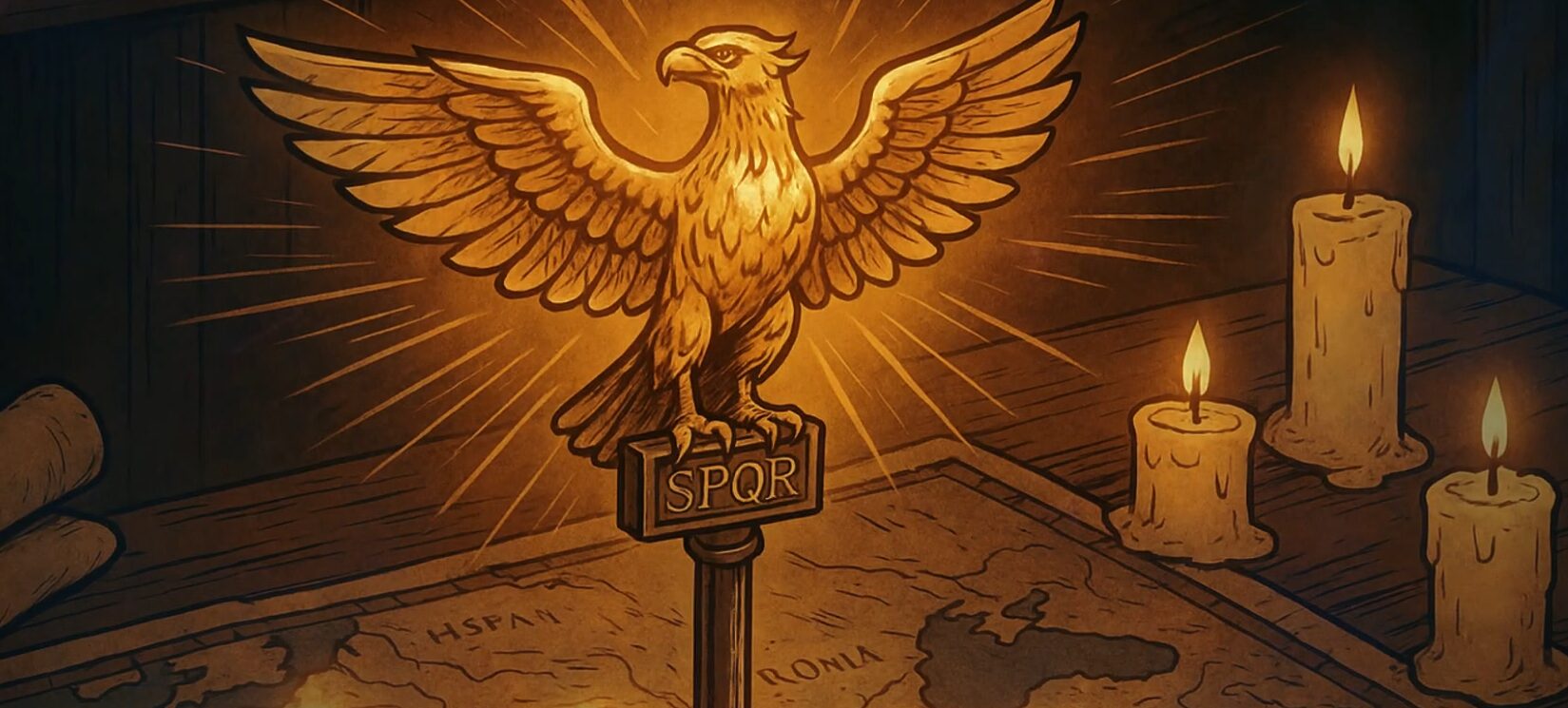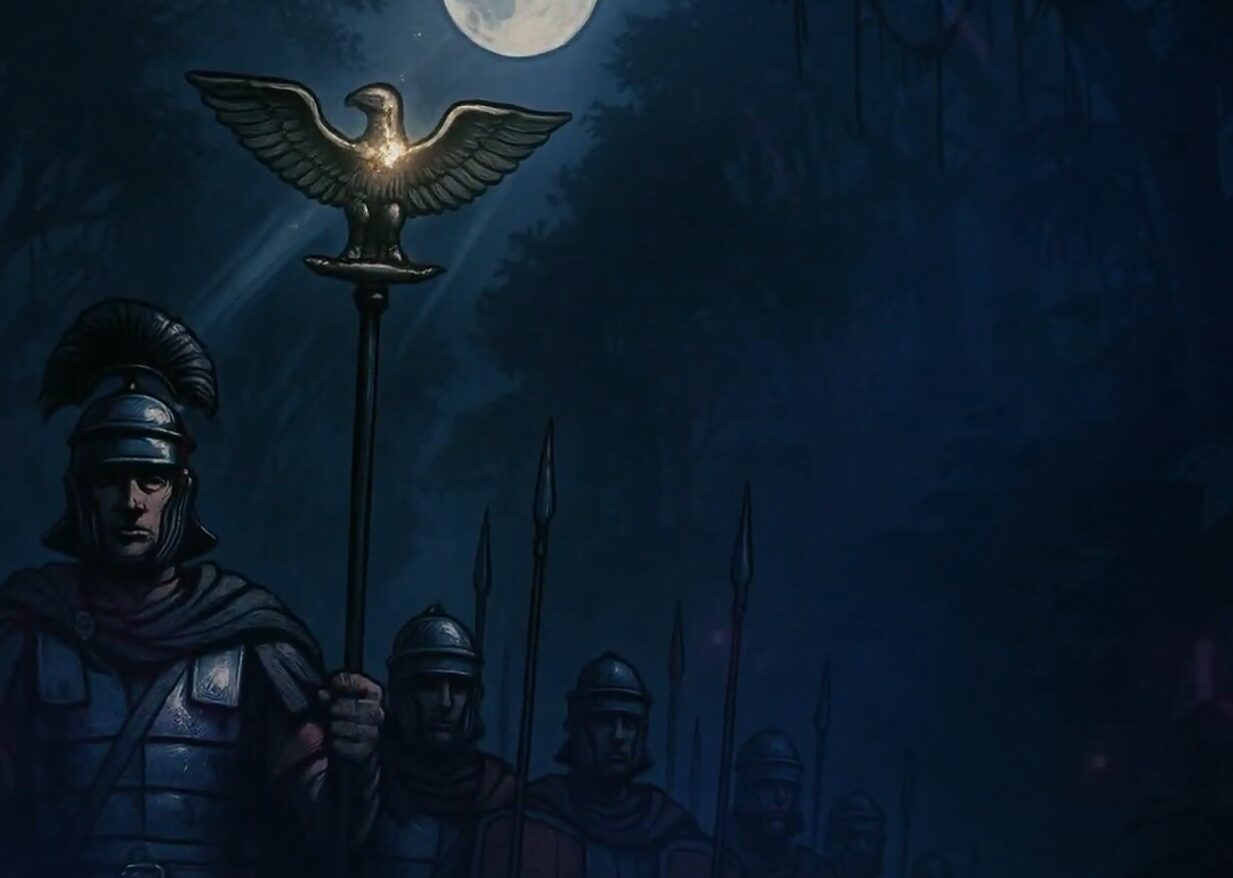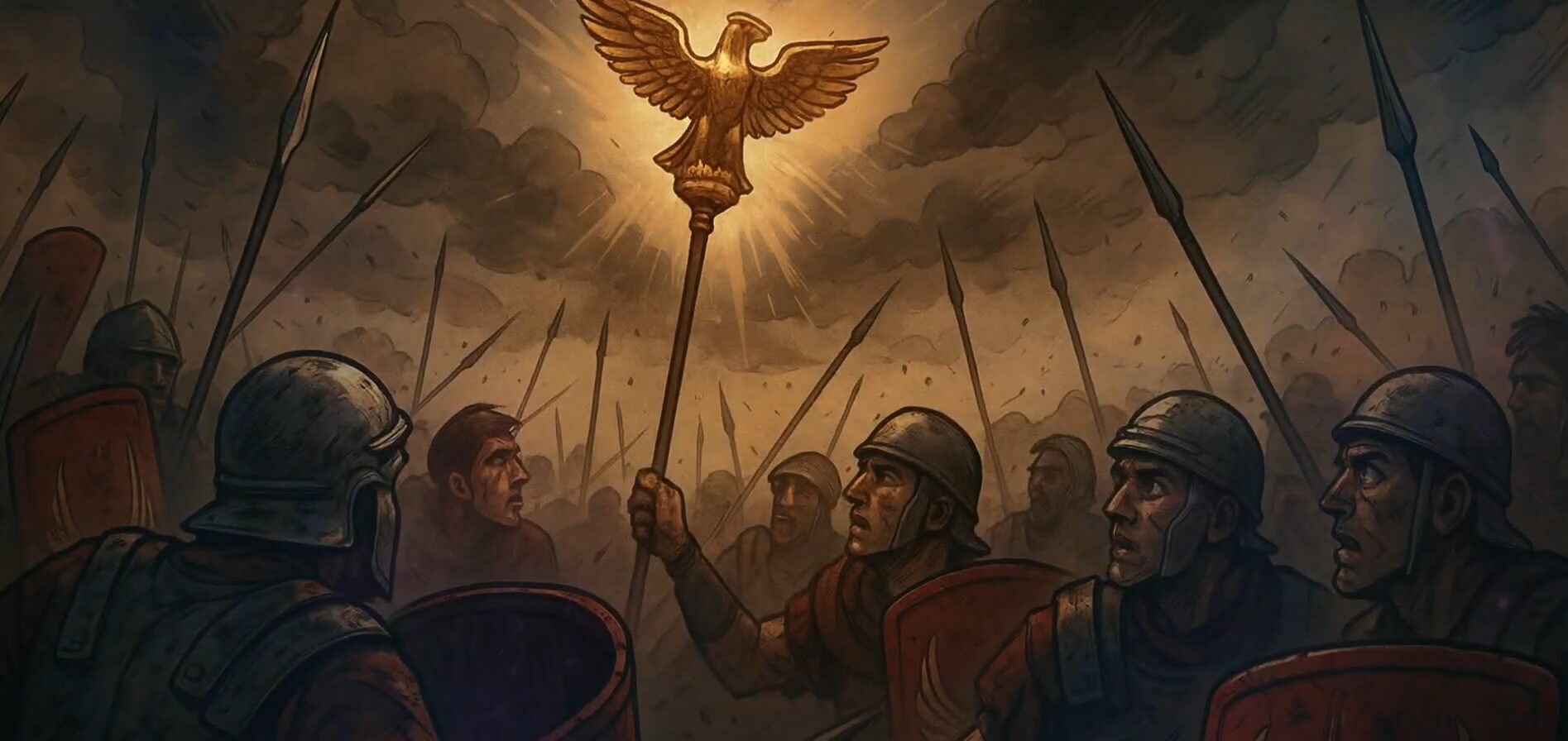The Roman legions stood as the backbone of an empire built on order and strength. Every soldier lived by strict discipline, bound by loyalty to their comrades and to Rome itself. Among their many symbols, none carried more weight than the eagle standard, the Aquila. It was more than a banner; it represented the spirit of the legion, the favor of the gods, and the pride of the Roman state. Losing it meant losing everything—honor, identity, and even divine protection.
For those who served, the Aquila was sacred. Its fall in battle marked not just military defeat but spiritual ruin. The story of one legion’s loss in the dark forests of Germania reveals how deeply that belief shaped Roman life and command. The tragedy that followed showed the unyielding expectations of Rome and the heavy price of failure.
Key Takeaways
- The Roman army valued discipline, unity, and loyalty above all.
- The eagle standard symbolized the legion’s spirit and Rome’s divine favor.
- Losing it brought disgrace, punishment, and an unending drive for redemption.
The Roman Legion: Structure and Discipline
Chain of Command and Ranks
The Roman legion followed a strict order of authority. At the top stood the legatus, who commanded the entire legion. Below him were senior officers like the tribunes, and beneath them were the centurions, each leading about 80 soldiers.
| Rank | Role | Approx. Command |
|---|---|---|
| Legatus | Legion commander | Entire legion |
| Tribune | Senior officer | Several cohorts |
| Centurion | Unit leader | ~80 soldiers |
| Optio | Assistant to centurion | Support role |
Every soldier knew his place. Orders flowed downward, and discipline held the structure together.
Training and Everyday Routine
Legionaries trained daily to build strength and endurance. They marched long distances with heavy packs, practiced formations, and drilled with weapons until every move became automatic.
Their days began early with inspection and ended with maintenance of weapons, armor, and camp duties. Punishments for mistakes were harsh, but rewards for loyalty and courage were real. This routine shaped soldiers into reliable parts of a larger system.
Duties of the Centurion
The centurion served as the backbone of the legion. He enforced discipline, led his men in battle, and made sure every order from above was carried out. His authority came not only from rank but from experience earned through years of service.
Centurions trained their soldiers, judged minor offenses, and maintained morale. They stood closest to the front lines, setting the example for courage and endurance. Their leadership kept the legion united even in the worst conditions.
The Significance of the Aquila
Sacred Meaning and the Power of Jupiter
The Aquila, shaped as an eagle, carried deep spiritual meaning for Roman soldiers. It stood as the earthly sign of Jupiter Optimus Maximus, the highest Roman god. Crafted from silver or gold, the standard symbolized divine favor and protection. When a legion carried the Aquila into battle, they believed Jupiter marched with them. Losing it meant more than defeat—it meant the gods had turned away, leaving the legion cursed and dishonored.
| Symbol | Meaning | Consequence of Loss |
|---|---|---|
| Eagle (Aquila) | Presence of Jupiter | Viewed as divine abandonment |
| Gold or Silver Material | Purity and strength | Loss brought spiritual ruin |
The Spirit of the Legion
Each legion tied its identity to its eagle. The Aquila was not just a marker—it was the soul of the unit. In the confusion of war, soldiers looked for the eagle to guide them and remind them who they were. It united them under one purpose and gave them courage to stand firm. Without it, the legion ceased to exist in spirit and name. It became a group of soldiers without meaning, stripped of its life and legacy.
Key Points:
- The Aquila served as the legion’s rallying point.
- Losing it erased the legion’s identity.
- A legion without its eagle was considered dead.
Symbol of Roman Pride and Duty
The Aquila also stood for the honor of Rome itself. Wherever it rose, it represented the authority of the Senate and the Roman people. It was more than a military emblem—it was the empire’s pride. If enemies captured it, they displayed it as proof that Rome could be humiliated. That loss shamed every Roman, from emperor to common citizen. Protecting the Aquila was a sacred duty, and failure to do so brought lifelong disgrace.
In essence:
- The Aquila embodied national dignity.
- Its capture was a public humiliation.
- Its defense was a matter of life and honor for every Roman soldier.
The Burden of Command
Duty of the Centurion
A centurion carried more than authority; he carried the weight of his legion’s soul. His command extended beyond orders and tactics. It meant guiding men who trusted him with their lives. Each soldier looked to him for courage and discipline when fear threatened to break their ranks.
| Role | Expectation | Consequence of Neglect |
|---|---|---|
| Leader in battle | Maintain formation, morale, and order | Collapse of unit discipline |
| Keeper of honor | Protect the legion’s symbol and values | Loss of respect and identity |
| Example to soldiers | Endure hardship without complaint | Erosion of trust and loyalty |
He stood as the living image of Roman strength, shaped by years of hardship and unwavering loyalty.
Devotion and Brotherhood
The bond among soldiers formed through pain, endurance, and shared purpose. They fought side by side, trusting each other completely. The centurion’s leadership was built on this trust. His men followed him not because of rank alone, but because he had once marched beside them.
- Shared hardship created unity stronger than fear.
- Mutual respect kept order even in chaos.
- Collective pride centered on the legion’s eagle, the heart of their identity.
When one man fell, the others carried his memory. Their loyalty was not just to Rome but to each other.
The Price of Defeat
When the eagle standard fell, it marked more than a lost battle. It shattered the spirit of the legion. To Rome, the loss meant the gods had turned away. For the soldiers, it meant their purpose had died.
Those who survived faced disgrace instead of honor. Their legion’s name was erased, their service forgotten. The centurion bore the heaviest punishment—held responsible for the fall, trapped between dishonor and death.
| Choice | Fate |
|---|---|
| Return to Rome | Public trial and execution |
| Remain in the field | Suicide to preserve dignity |
The system left no mercy. The same discipline that once gave the legion strength now demanded its sacrifice.
The Battle in the Teutoburg Forest
The Trap and the Panic
Rain poured over the dense forest as the Roman column struggled through deep mud. The soldiers moved slowly, their armor heavy, their formation breaking apart in the narrow paths. The trees blocked their view, and the fog muffled every sound. Then, sudden war cries burst from the shadows. Germanic warriors charged from all sides, throwing spears and swinging axes. The disciplined Roman lines collapsed into confusion.
Key conditions during the attack:
| Element | Description |
|---|---|
| Terrain | Thick forest and uneven ground |
| Weather | Heavy rain and fog |
| Enemy | Hidden Germanic fighters attacking from all directions |
| Result | Roman formation broken and soldiers isolated |
The Death of the Standard Bearer
In the midst of the chaos, the Aquilifer—the bearer of the legion’s eagle—fought to keep the standard upright. Surrounded by guards, he swung his sword with desperate strength. A massive blow from an enemy axe split his shield and struck his neck. He fell to the ground, and the eagle sank into the mud beside him. The soldiers nearby tried to reach him, but the enemy pressed too hard.
The fall of the Aquilifer marked the breaking point. The sight of the fallen standard sent shock through the ranks. The legion’s center of courage was gone.
The Capture of the Eagle
Before any Roman could recover the eagle, a Germanic chieftain seized it and lifted it high above the battlefield. His warriors roared in victory. The Romans saw the sacred symbol of their legion in enemy hands—a moment that crushed their spirit.
- Symbolic meaning: The eagle stood for the legion’s soul, Rome’s honor, and divine favor.
- Consequence: Its loss meant disgrace and the end of the legion’s identity.
The defeat in the forest erased the legion from Rome’s records. Survivors carried the mark of failure, and the empire vowed to reclaim the stolen eagle, no matter the cost.
Aftermath of Losing the Aquila
Dissolution of the Ninth Legion
The loss of the eagle standard erased the identity of the Ninth Legion. Rome struck its name from every record, marking it as damned. The legion no longer existed in the eyes of the empire. What had once been a proud unit became a symbol of disgrace.
| Status | Outcome |
|---|---|
| Legion Name | Removed from official rolls |
| Reputation | Declared dishonored |
| Future | Disbanded permanently |
Lives of the Remaining Soldiers
The few who survived the ambush faced harsh punishment. Instead of being honored for endurance, they were labeled as failures. Rome scattered them across distant outposts, separating comrades who had once fought side by side.
- They lost all rank and recognition.
- They served under new legions in remote provinces.
- They carried the shame of defeat for the rest of their lives.
The Commander’s Choice
Their leader bore the heaviest burden. As the senior centurion, he faced two grim paths—return to Rome for public execution or end his life on the battlefield. Either choice meant death, but one offered a final act of dignity. His decision reflected the rigid code that ruled Roman honor: failure demanded sacrifice, even when survival itself was punishment.
Rome’s Relentless Pursuit
A Nation Shamed
When the legion’s eagle fell into enemy hands, Rome felt a wound deeper than any defeat on the battlefield. The loss of the Aquila meant more than a tactical failure—it symbolized the gods’ abandonment and the death of a legion’s spirit.
| Meaning of the Eagle | Impact of Its Loss |
|---|---|
| Sacred emblem of Jupiter | Seen as divine rejection |
| Soul of the legion | Legion declared dead |
| Symbol of Roman honor | Nation-wide humiliation |
Every Roman citizen, from emperor to farmer, shared the shame. The legion’s name was erased from records, its survivors scattered across distant outposts, marked forever as dishonored soldiers.
The Empire Strikes Back
Rome refused to let disgrace define it. The emperor ordered a campaign not for conquest, but for redemption. The mission’s single aim was clear—recover the lost eagle and restore Rome’s pride.
Objectives of the Imperial Campaign:
- Retrieve the captured Aquila.
- Reassert Rome’s divine favor.
- Prove that no enemy could defy the empire without consequence.
The operation demanded vast resources and manpower, showing how far Rome would go to erase shame and reaffirm its authority.
The Shadow of the Fallen Eagle
The missing standard became legend. It haunted generals, inspired poets, and shaped Rome’s military code for generations. Even long after the battlefield fell silent, the story of the lost eagle stood as a warning.
Lesson remembered:
- Honor once lost could only be reclaimed through relentless pursuit.
- The Aquila was not just metal and gold—it was the empire’s soul, and Rome would never rest until it was found.




